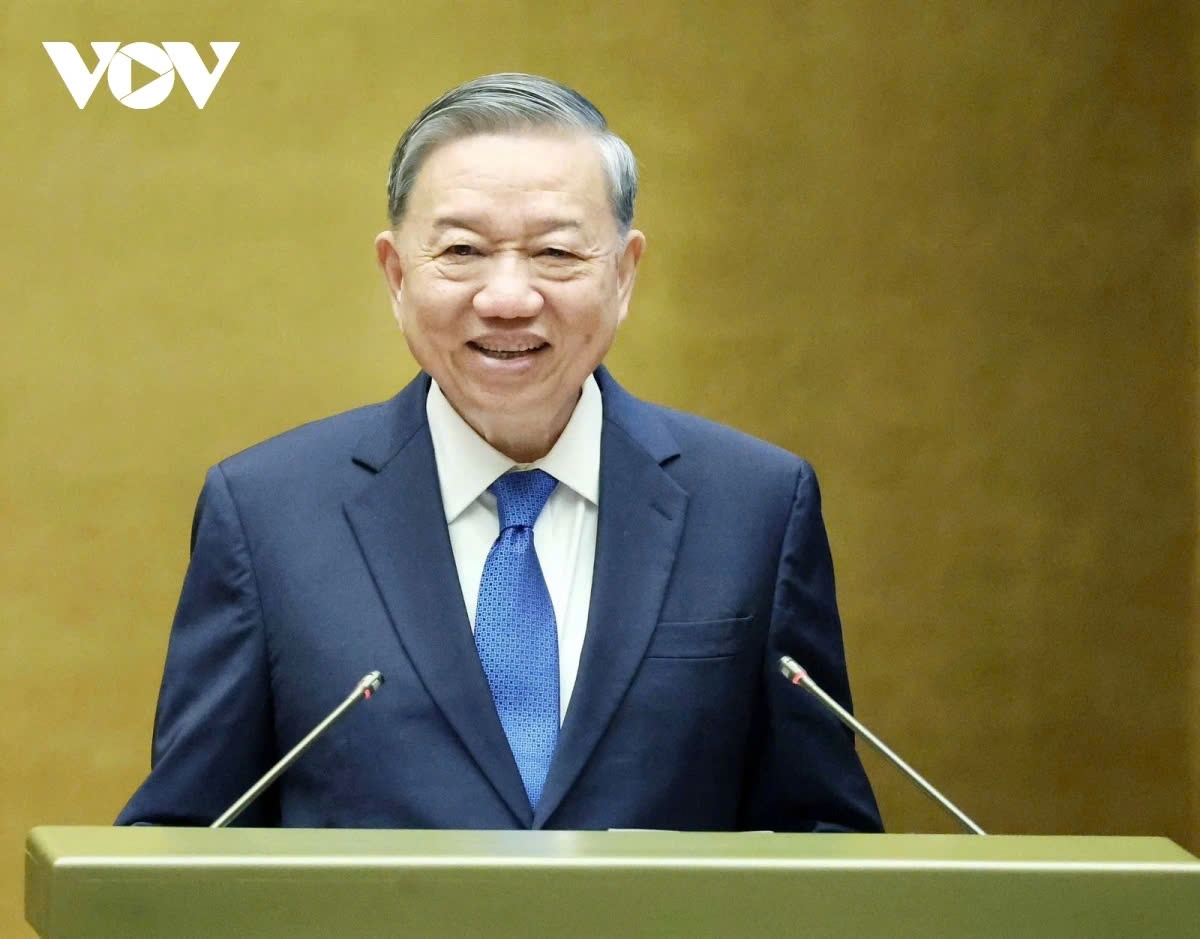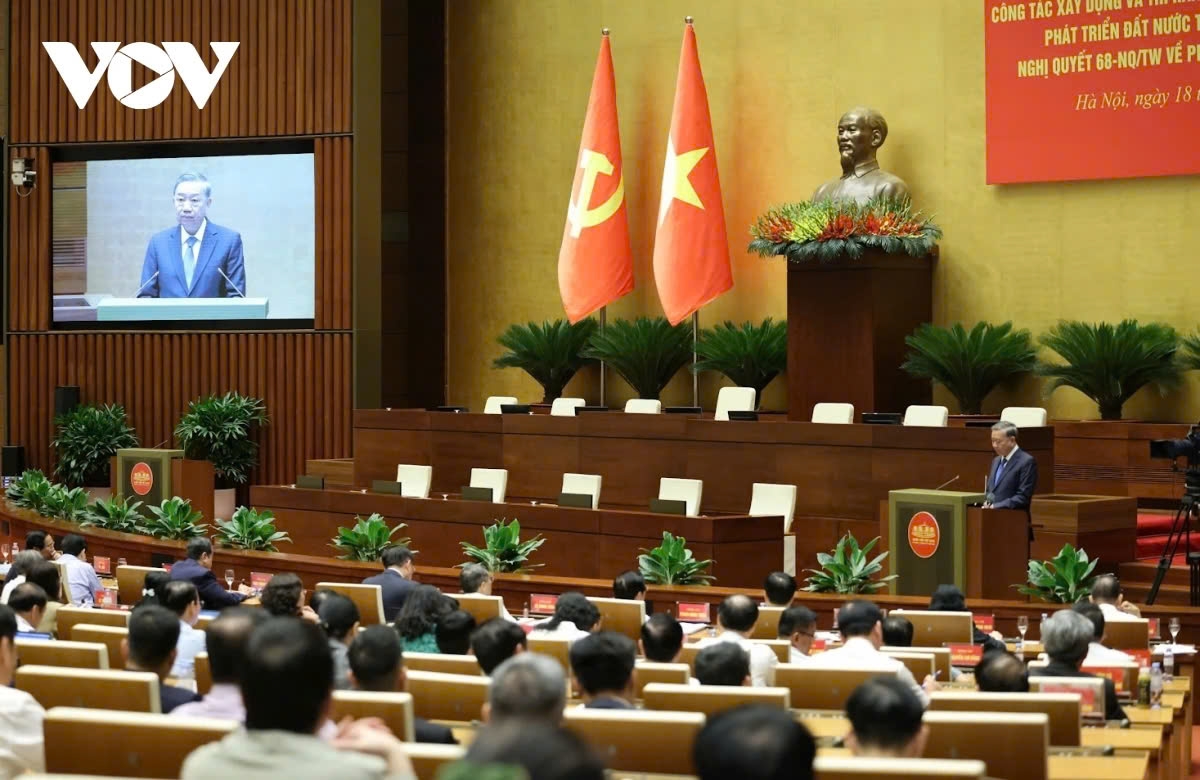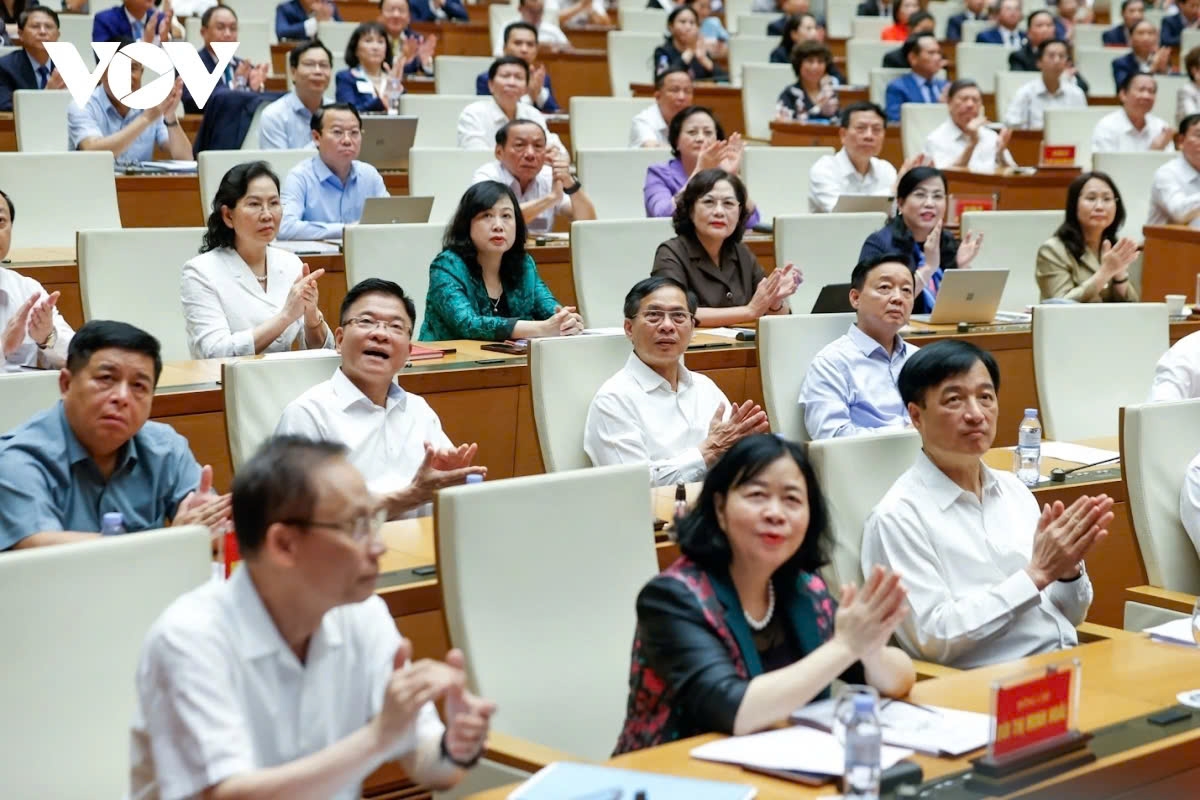VOV.VN - Party General Secretary To Lam has said that the effective implementation of the four Resolutions recently issued by the Politburo will help Vietnam “take off” because they directly target the country’s strategic breakthroughs and address longstanding bottlenecks in national development.

Addressing a national conference to concretise two Party resolutions on legal reform and private sector development in Hanoi on May 18, the Party leader again talked about the significance of the four important Resolutions adopted by the Politburo.
The four resolutions are Resolution No. 57 dated December 22, 2024 on promoting science, technology, and innovation; Resolution No. 59 dated January 24, 2025 on proactive and deep international integration; Resolution No. 66 dated April 30, 2025 on comprehensive reform in legal development and enforcement; and Resolution No. 68 dated May 4, 2025 on vigorously developing the private sector.
According to the Party leader, the resolution address four critical bottlenecks of the economy, namely technology, global integration, institutional reform, and growth drivers. They lay the strategic foundations for realising the national vision of becoming a high-income developed country by mid-21st century.
He stressed that after nearly 40 years of implementing the Đổi Mới (Renovation) policy, Vietnam has recorded significant accomplishments, but complacency must be avoided. Continuous innovation and the mobilisation of all societal resources are necessary to meet the set goals.

Highlighting the core spirit of Resolution 68, he reaffirmed the Party and State’s stance on building a modern team of entrepreneurs capable of reaching global stature, carrying the noble mission of building a prosperous and powerful Vietnam.
Building on that foundation, he said, the Resolution calls for bold reforms by strengthening institutions, safeguarding property rights, ensuring business freedom, and fostering a fair, transparent, and stable investment climate. It emphasises the need to unlock resources and expand private sector access to land, credit, and technology. At the same time, it seeks to dismantle entrenched institutional and policy barriers, drive innovation, and cultivate a dynamic startup ecosystem.
According to the top leader, support must be directed toward enabling private enterprises to invest in research and development and integrate more deeply into global innovation networks and value chains.
“We must nurture a new generation of modern entrepreneurs that are not only adept in business but also politically astute, intellectually equipped, ethically grounded, deeply patriotic, and inspired by a commitment to national development and global reach,” stressed Lam.
With regard to the four key tasks that the entire political system must decisively implement under Resolution 57, the General Secretary noted that science, technology, and innovation are not merely supporting tools, but the foundation and primary driving force behind the country's industrialisation and modernisation in this new era.

The resolution, he said, requires strengthening the Party’s comprehensive leadership over science – technology development and innovation, and fully harnessing the role of businesses, entrepreneurs, intellectuals, and the people in this effort.
“We must act with a spirit of bold, consistent, and coordinated reform. We must not allow outdated thinking or passive, bureaucratic practices to stand in the way of progress,” stressed the leader.
Once again underscoring the need to reform lawmaking and law enforcement, the General Secretary called for clear decentralization and delegation, eliminating permission-based mechanisms, and eradicating vested interest groups.
In his view, the legal system serves both as a driving force and a cornerstone for national development. A coherent, practical, and transparent legal framework is essential to ensure a stable business environment, encourage innovation, strengthen international integration, and remove obstacles stemming from overlapping or contradictory laws.
“To achieve this, we must fundamentally transform our legal mindset, from one of control to one of facilitation, from passive response to proactive, development-oriented creation. Lawmaking must take the lead, guided by clarity, foresight, and alignment with the country’s evolving realities and urgent development demands,” he stated.
He remarked that 2025 is a pivotal year marking the start of a new era, with the goal of becoming a developed country in just two decades. If reform momentum is not accelerated now, a golden opportunity may be missed, and Vietnam could be left behind in the global race.
He therefore urged the entire political system to implement tasks rapidly, systematically, and effectively, with real outcomes as the key measure.
The leader then outlined major priority tasks to be carried out, including quickly finalising and issuing national programmes and action plans to implement the four resolutions with clear objectives, tasks, timelines, and responsibilities; developing monitoring and evaluation indicators for periodic review; and conducting a comprehensive legal review to amend, supplement, or abolish inappropriate regulations in line with Resolution 66-NQ/TW.
He requested promoting policy dialogue between the Government, businesses, citizens, and intellectuals to mobilise collective wisdom in implementation, alongside strengthening public communication to build social consensus.
VOV.VN - On May 4, 2025, on behalf of the Politburo, Party General Secretary To Lam signed Resolution No. 68-NQ/TW on private economic sector development, which underscores that the private economic sector is one of the most important drivers of the national economy.
VOV.VN - Scholars and economic experts, while attending a seminar on May 13, affirmed that Resolution 68-NQ/TW of the Politburo on the private sector is a significant document that reflects the Party’s orientations to vigorously promote the development of the private sector.
VOV.VN - With a majority of votes in favour, the National Assembly adopted a Resolution on several special mechanisms and policies aimed at promoting the development of the private sector in Vietnam, at its ongoing sitting in Hanoi on May 17.
Bình luận
Bình luận của bạn sẽ được xét duyệt trước khi đăng